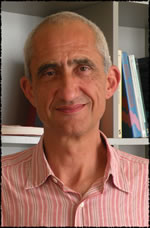 On October 18th, Professor Fernando Vega-Redondo visited CERGE-EI to present his paper ‘Social Networks and the Process of Globalization.’ Professor Vega-Redondo specializes in Game Theory, Evolutionary Theory, and Social Networks. A graduate from University of Minnesota, he is currently on faculty at the European University Institute in Florence.
On October 18th, Professor Fernando Vega-Redondo visited CERGE-EI to present his paper ‘Social Networks and the Process of Globalization.’ Professor Vega-Redondo specializes in Game Theory, Evolutionary Theory, and Social Networks. A graduate from University of Minnesota, he is currently on faculty at the European University Institute in Florence.
In the beautiful interior of CERGE-EI, Dr. Vega-Redondo gave an interesting and thought-provoking lecture on his most recent research on globalization (which he did in collaboration with Georg Duernecker). In the paper, the authors propose a dynamic model to understand the role of social networks in the process of globalization. They define globalization as the process when distant agents interact, and they use this ‘spatial’ theoretical framework to understand the relationship between globalization and economic growth. Their model allows for the existence of social networks – the only channel through which geographically-distant agents can cooperate in economic activity. Without the phenomenon of ‘global social networks,’ economic activity will stagnate.
To shed light on the main objective of the paper, the lecturer started by answering two important questions related to the paper – ‘What is globalization?’, and ‘Why is globalization important?’ He then continued on to the main focus of the paper – the dynamic model itself. The model incorporates the idea that ‘connections breed connections’ by providing linking opportunities and building trust between agents.
Presentation of the model was divided in two parts: the first part covered the setup of the model with social networks included; the second part described the evolution of the social network itself. He explained how ‘going global’ can in fact be an abrupt occurrence in a social network, and how the right level of a local economy’s ‘geographical cohesion’ is crucial in this process.
Dr. Vega-Redondo’s visit to CERGE-EI provided for stimulating discussion about the global changes happening in the world economy. His research provides a much-needed theoretical contribution to the predominantly empirically-based literature on globalization processes. CERGE-EI would like to sincerely thank him for his visit!